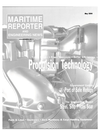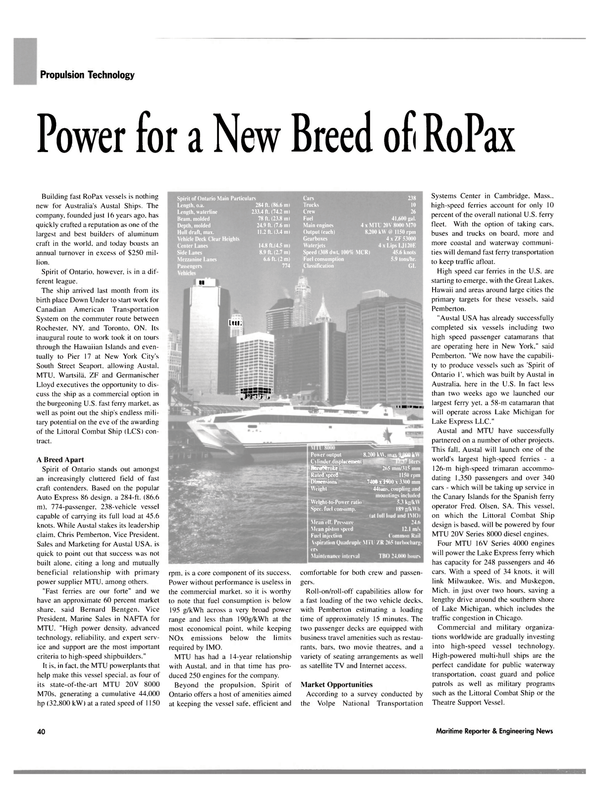
Ice Class & Large Ships Pose New Challenges
New challenges lie in store for northern shiprepair yards as a new generation of ultra sophisticated ice-class tankers join the fleet. So far. South Korean builders are in the vanguard of these new vessels' construction, built to carry oil from reserves located in some of the world's coldest and most inhospitable places. But ship designers, coastal states with seasonal or year-round ice and classification societies are all preparing for new vessels in the Aframax and Suezmax categories. Designs are being model-tested and new construction criteria are being drawn up by leading class societies such as Lloyd's Register, DNV and ABS. The new vessels will lift cargoes in the North Baltic, the Arctic and Far Eastern areas of Russia. Exports from the Former Soviet Union have already increased by 50% since 1996.
But Russian oil cargoes, piped to Primorsk. have expanded from 12m tons in 2002 to a forecast 42m tons this year and some analysts believe volumes could soar to well over 100m tons by 2010. Lloyd's Register believes that new designs of "double-acting" tankers - ships that are built both for conventional open-sea operation but with icebreaking capability running full astern - will provide potential for some of the northern-most oil developments. The Tempera and Master double-acting tankers were delivered to Finnish energy group Fortnum Oil and Gas last year.
The Sumitomo-built 106,000 dwt vessels are built to sail forward through light ice. but astern through heavy ice conditions. With azipods and thrusters, the tankers can turn through 180 degrees and will be deployed on a special route around the Turku archipelago off the coast of Finland.
Read Ice Class & Large Ships Pose New Challenges in Pdf, Flash or Html5 edition of May 2004 Maritime Reporter
Other stories from May 2004 issue
Content
- Fincantieri Delivers Westerdam page: 10
- "World's Largest" Heavy Lift Ship Enters Service page: 10
- Damen Delivers Pair of Tugs page: 10
- Not Just Another Dam Ship page: 12
- Welsh Towing Company Growth Continues page: 14
- Gladding-Hearn Starts Construction of New I neat Vessel page: 15
- Despite 11% Increase, Hempel Disappoints page: 15
- Grimaldi-Naples Receives GM Award page: 16
- Schlueter Promoted to VP page: 17
- Misplacing the Place of Refuge page: 20
- Schottel Broadens Electric Propulsion Options page: 26
- CIMAC Congress Set for Kyoto page: 29
- Waterjets for a Difficult Design Task page: 30
- New Shaft Seal from Ocean Venture Seals page: 31
- Gas Turbines: Keeping Fresh With Innovation page: 32
- MAN B&W Diesel Debuts the New S65ME-C page: 33
- Thordon COMPAC Finds Success in FSV page: 33
- Wartsila to Power Australian FPSO page: 34
- VSP: Same Power, 9% More Bollard Pull page: 35
- The New MTU 2000 CR Marine Engines page: 36
- Converting and Repowering One Very Big Ship page: 38
- Power for a New Breed of RoPax page: 40
- ZF Helps to Harness Spirit of Ontario's Power page: 41
- Greece Poised for Posidonia 2004 page: 42
- Leif Hoegh Records Strong First Quarter page: 43
- BV Launches LNG CAP page: 43
- Steel, Ship Prices Soar as Tankers Stay Firm page: 44
- Ice Class & Large Ships Pose New Challenges page: 44
- Royal Caribbean Stays Current with C-MAP CM-93/3 ECs page: 46
- JRC Proposes Integrated Nautical Safety System page: 46
- C-Map's RTU and the Ending of the Paper Trail page: 47
- AutoChief C20 Reports Good Market Penetration page: 48
- Vision FT IBS page: 48
- Research Winches for R/V Maria S. Merian page: 52
- Konecranes Giving Port Efficiency a Lift page: 52
- Chinese Yard Logs Strong Month page: 55
- Fuel Oil Separation Takes Center Stage page: 56
- Security of Ports and Vessels: A New Approach page: 60


